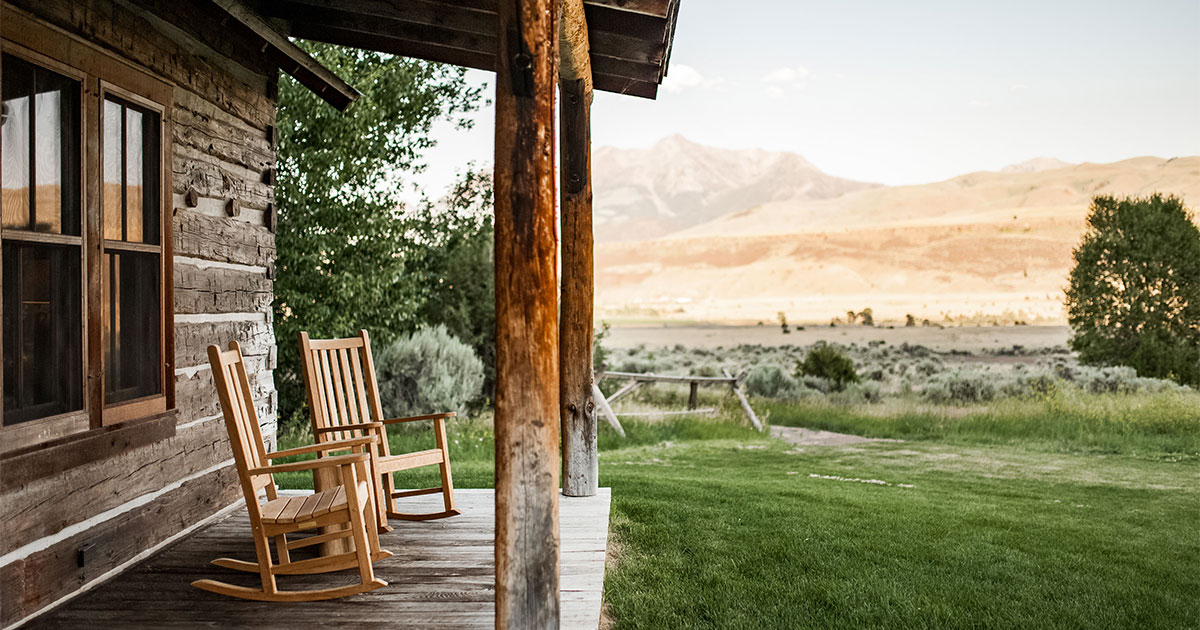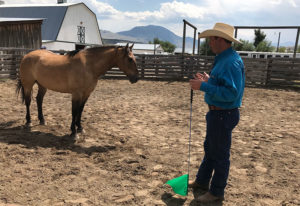In the Saddle with Entrepreneurial Leaders

Under a big Montana sky, a man in a black cowboy hat works with a white horse, which walks, trots, and lopes around a corral.
The peaceful, lazy scene looks like something out of a Western movie and feels much removed from the day-to-day office grind. But, as the man in the hat explains, the lessons learned from horses actually have relevance far beyond the corral. “Working with horses—I think a lot of it is the same as working with people,” says Terance Eichhorn, the chief wrangler at the West Creek Ranch in Emigrant, Montana.
Eichhorn is constantly focusing on the horse’s slight, nonverbal cues. Is it guarded or distracted? Is it relaxed? “I have to pay attention to a lot of little subtleties that this horse is giving me,” says Eichhorn. “He’s going to be paying attention to all my little subtleties, too. I have to be aware of how I present myself. He’ll feed off my energy, whether it’s good or bad.”

In the same way, people also need to pay attention to each other’s nonverbal cues, especially in these days of coronavirus, with masks covering much of our faces and interactions taking place via video. “Things are easily misconstrued, even with people who have worked together for a long time,” says Eichhorn.
This unique, equine-inspired perspective on workplace communication is just one part of a larger certificate program offered by Babson’s Arthur M. Blank School for Entrepreneurial Leadership. The mission of this program, Entrepreneurial Leadership in the Social Sector, is to help organizations use entrepreneurial leadership principles to develop real-world solutions to important social issues.
“We want to empower them as entrepreneurial leaders,” says Cheryl Kiser, executive director of Babson’s Lewis Institute for Social Innovation and the leader of the certificate program. “The program transforms how they think. We ask them to go outside their comfort zone. They come up with things they never thought of before.”
And all this learning and transformation takes place in an inspiring location, where horses roam and the sky seems to stretch forever.
Going Online
Owned by the Arthur M. Blank Family Foundation, the 6,600-acre West Creek Ranch serves as a place for leaders of companies and nonprofit organizations to get away from their routines and gather for camaraderie and creativity. Outdoor activities such as hiking and horseback riding are an integral part of any visit to the ranch, which is bordered by the Yellowstone River and Gallatin National Forest. “When you go there, it is quite an experience. It touches your soul,” says Kiser. “It is magnificent.”
“We want to empower them as entrepreneurial leaders. The program transforms how they think. We ask them to go outside their comfort zone. They come up with things they never thought of before.”
Cheryl Kiser, executive director of the Lewis Institute for Social Innovation
Babson has offered the certificate program three times, the first two of which were held in person at West Creek Ranch. This past summer’s edition, however, had to be reimagined because of the pandemic. That meant going virtual, though Babson didn’t want to lose all of the ranch’s magic. “I thought, ‘How can we bring the ranch online?’ ” says Kiser.
So, this summer, Eichhorn the wrangler still stood in the corral and gave his usual talk about nonverbal communication, but program participants watched him online. Another mainstay of the ranch, chef George Peirce, spoke virtually of how he brings intentionality and creativity to cooking and how he uses local ingredients that he has at hand. He was joined in the conversation by chef and TV personality Andrew Zimmern, an entrepreneur in residence at Babson who has participated in many College events through the years. “When Cheryl asks me to do something, the best thing I have learned in my experience is to just say yes,” says Zimmern.
A Transformative Experience
For the organizations that participate in the certificate program, Kiser hopes they embrace a different way of thinking. Too often, she says, nonprofits fixate on what they don’t have. “They never have enough money or enough resources,” she says. “It’s a mindset of scarcity.”

Instead, she wants participants to come away with an entrepreneurial mindset, one built on optimism and action that allows them to make the best use of whatever limited resources they do have.
This summer’s attendees were from the Behavioral Health Alliance of Montana. Made up of mental and behavioral health providers from across Montana, BHAM strives to ensure mental health equity for the state’s residents. In an online ceremony to mark the end of the two-week program, BHAM attendees talked of how renewed and energized they felt, of how they were ready to take the next step as an organization.
“The progress that I have had the privilege of watching you make over two weeks is stunning,” Dwight Gertz told the group. The senior lecturer in management at Babson was a program instructor. “Your voice is becoming more unified, and your understanding of both your problems and opportunities has moved remarkably.”
Such is the progress that happens when transformative teaching is combined with a stirring setting. “It ends up being pretty powerful,” says Kiser. “It’s probably one of the most powerfully rewarding experiences I’ve had at Babson.”
Posted in Entrepreneurial Leadership






